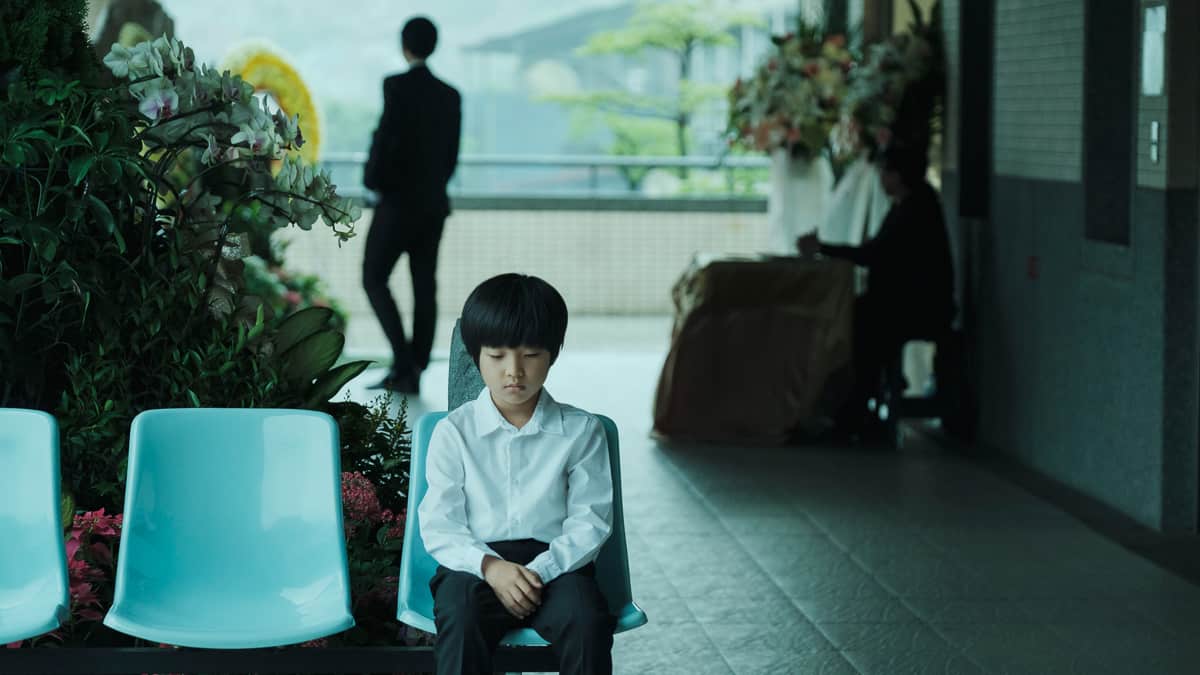Dear Tenant
| Dear Tenant | |
|---|---|
 | |
| Traditional Chinese | 親愛的房客 |
| Hanyu Pinyin | Qīn'ài De Fángkè |
| Hokkien POJ | Chhin‑ài-ê-pâng‑kha |
| Directed by | Cheng Yu-chieh |
| Written by | Cheng Yu-chieh |
| Produced by | Yang Ya-che Cheng Yu-chieh |
| Starring | Mo Tzu-yi Chen Shu-fang Runyin Bai |
| Cinematography | Meteor Cheung |
| Music by | Frandé |
Production companies | Filmosa Production Outland Film Production |
Release dates |
|
Running time | 106 minutes |
| Country | Taiwan |
| Languages | Mandarin Taiwanese Hokkien |
Dear Tenant (Chinese: 親愛的房客) is a 2020 Taiwanese drama film directed by Cheng Yu-chieh starring Mo Tzu-yi, Chen Shu-fang and Runyin Bai.[1][2] It was primarily filmed in Keelung city and contains themes such as homosexuality, euthanasia and adoption rights. The film won both Best Leading Actor for Mo and Best Supporting Actress for Chen at the 57th Golden Horse Awards.[3]
- Mo Tzu-yi as Lin Jian-yi (林健一)
- Chen Shu-fang as Zhou Xiu-yu (周秀玉)
- Runyin Bai as Wang You-yu (王悠宇)
- Yao Chun-yao as Wang Li-wei (王立維)
- Jay Shih as Wang Li-gang (王立綱)
====
Dear Tenant
Original title: Qinai de fangke
2020
1h 46m
IMDb RATING
YOUR RATING
Morning Tzu-Yi Mo in Dear Tenant (2020)
A boy lives with his Grandma and Mr. Lin, the tenant who looks after him and Grandma. But when Grandma passes away, the boy's uncle returns to Taiwan and discovers that ownership of the apartment was transferred to other people.
Director
Yu-Chieh Cheng
Writer
Yu-Chieh Cheng
Stars
Morning Tzu-Yi MoShu-Fang ChenRun-yin Bai
See production info at IMDbPro
6
User reviews
9
Critic reviews
Awards
4 wins & 6 nominations
Photos
9
View Poster
View Poster
View Poster
View Poster
View Poster
View Poster
+ 3View Poster
Top cast
11
Morning Tzu-Yi Mo
Morning Tzu-Yi Mo
Lin(as Tzu-Yi Mo)
Shu-Fang Chen
Shu-Fang Chen
Grandma…
Run-yin Bai
Run-yin Bai
Yo-Yu(as Run-Yin Bai)
Chun-Yao Yao
Chun-Yao Yao
Li-Wei
Jay Shih
Jay Shih
Li-Gang
Chiung-Hsuan Hsieh
Chiung-Hsuan Hsieh
Prosecutor Chang(as Cherry Hsieh)
Pong Fong Wu
Pong Fong Wu
Sergeant(as Pon-Fong Wu)
Nelson Shen
Nelson Shen
Tsai(as Wei-Nien Shen)
Ko-Yuan Wang
Ko-Yuan Wang
Eric
Vera Chen
Vera Chen
Joyce
Shu-Mei Huang
Director
Yu-Chieh Cheng
Writer
Yu-Chieh Cheng
All cast & crew
Production, box office & more at IMDbPro
More like this
My Missing Valentine
7.2
My Missing Valentine
Dear Ex
7.3
Dear Ex
American Girl
7.1
American Girl
Eternal Summer
7.0
Eternal Summer
Classmates Minus
7.1
Classmates Minus
The Falls
7.0
The Falls
Till We Meet Again
6.7
Till We Meet Again
Your Name Engraved Herein
7.3
Your Name Engraved Herein
Light the Night
7.4
Light the Night
Su nü yang cheng ji
8.5
Su nü yang cheng ji
A Sun
7.6
A Sun
Cape No. 7
7.0
Cape No. 7
Storyline
For the past five years, Lin has been looking after the son (Yo-yu) and the elderly mother (Mrs. Chou) of his deceased boyfriend (Li-wei). They live together like a family, and it is Lin's way of remembering Li-wei: by continuing to be in the life he once had and loving the people he once loved. But when Mrs. Chou passes away, her other son (Li-gang) returns from overseas and discovers that Mrs. Chou's property has been passed down to Yo-yu, whom Lin has legally adopted. Li-gang contacts the police, accusing Lin of killing his mother for attempting to own the property. As the ensuing investigation continues, more and more evidence mounts against Lin.
Plot summaryAdd synopsis
Taglines
An unbreakable bond.
Genres
DramaRomance
Parents guide
Add content advisory
User reviews
6
Featured review
10
/10
Do u feel happy?
A slow pace movie that slowing guide u into their emotion without knowing. A warm touching movie move u to tears easily by their natural acting and lines. Now it's still giving me a great impact after 2 weeks watching this movie. Can see the two actor's speech from this show winning the golden horse award to show how should a great actor they are.
helpful
•
8
1
==
 Drama, Films, LBGTQ+, Recommended posts, Reviews, Taiwan
Drama, Films, LBGTQ+, Recommended posts, Reviews, TaiwanDear TenantWednesday, 27 October, 2021Andrew Heskins

親愛的房客. Taiwan 2020. Directed by Cheng Yu-chieh. Starring Mo Tzu-Yi, Chen Shu-fang, Runyin Bai, Yao Chun-yao. 112 mins. In Mandarin with English subtitles.Leave a commentFacebook
A superb drama exploring LGBTQ equality against traditional gender roles…
A sensitive and moving drama touching on themes of homosexuality, euthanasia and adoption rights is the latest work from the multitalented writer, director, producer and actor Cheng Yu-chieh (Days We Stared at the Sun, Yang Yang) to touch on social and identity issues within Taiwanese society. The film was nominated at various honours at the 57th Golden Horse Awards, deservedly winning Best Leading Actor for Mo Tzu-Yi (Ro Sun, Do Over) and Best Supporting Actress for veteran Chen Shu-fang (Taipei Story, Daughter of the Nile), as well as Best Original Film Score for composer Fran Chen. The film has played several festivals, including Udine Far East Film 2021 and Queer East Film Festival 2021.
Mo Tzu-Yi plays music teacher Lin Jian-yi, a dutiful tenant to the ageing Mrs. Chou (Chen Shu-fang), tending to her pains from diabetes and looking after her late son Wang Li-wei’s (Yao Chun-yao, Au Revoir Taipei, The Mirror) nine-year-old boy Yo-yu (Bai Run-yin, The Bold, the Corrupt, and the Beautiful, Mr. Long). Things aren’t exactly as they seem, as Chou’s other son returns after her death to find the ownership of her apartment transferred to Yo-yu, and Yo-yu in turn adopted by Lin. As accusations fly about his motives, we see in flashback how Lin came to mean so to the family, and the true nature of his relationship with Wang.
Cheng allows the story to unfold slowly as we uncover one layer after another. He continues to prove himself adept at tackling various issues. From the identity crisis of Yang Yang, a young woman constantly compared to a French heritage she can’t connect with, never having met her father, to the indigenous battles over land of Wawa No Cidal (aka Panay, co-written and directed by Lekal Sumi Cilangasan). Here we see him considering the ramifications of changes in the law that saw Taiwan become the first territory in Asia to recognise same-sex marriage. And wondering just how ready society is, despite its reputation as the most progressive in Asia when it comes to LGBTQ+ rights.
Deep-set prejudices still ripple through society, with police attitudes to men who have gay meet-up apps on their phone seeming stuck decades in the past, and parents of his students no less forgiving, making his job untenable. Such notions of what really makes family echo a recurring theme in Hirokazu Kore-eda’s work, from Like Father, Like Son to Shoplifters. The ridiculousness of Lin’s situation is that his situation is no different from anyone’s over the child of a partner, it’s just traditional mindsets that confine genders and roles.
The cinematography by from the spectacularly-named Meteor Cheung, who worked with Cheng on Days We Stared at the Sun, is highly considered if hardly glamorous. The port of Keelung, to the north of Taipei, is shown with all the soggy glory its reputation as ‘raining city’ deserves. When Lin takes to the hiking trail in the mountains nearby, a similarly sodden approach to framing can hardly disguise just how breathtaking the scenery is. But the bottom line is that this creates room for the actors to portray their roles without becoming overly melodramatic. Mo Tzu-Yi’s wonderfully understated performance in the lead is easily a highlight.
The result is a solid film that isn’t only commendable but poignant too, and one that will keep you thinking about the themes explored long after.
Dear Tenant had its UK Premiere as the closing film of Queer East Film Festival 2021, and screens at Midlands Arts Centre, Birmingham, Filmhouse, Edinburgh and Showroom Cinema, Sheffield, as Queer East tours various highlights around the UK. See the official website for more details.
About the author
Founder of easternKicks.com, which he's been running since 2002. And it's all thanks to Monkey, Water Margin and those damn fantastic 80s Hong Kong action movies! Andy works as a graphic designer in London... More »
Read all posts by Andrew Heskins
==
Media Partners•Reviews•San Diego Asian Film Festival (SDAFF)•Taiwanese Reviews
Film Review: Dear Tenant (2020) by Cheng Yu-chieh
Panos Kotzathanasis

Add CommentShare This!
Films focusing on LGBT themes having been creating ripples in Taiwanese cinema during the last few years, with titles like “Dear Ex” and “Your Name Engraved Herein” becoming both critical and commercial successes. The latest film to be added to this chain is “Dear Tenant”, a box office hit in the country that also netted awards for Best Actor, Best Supporting Actress and Best Original Score at the Golden Horse Awards.
“Dear Tenant” is screening at San Diego Asian Film Festival

For the past five years, Lin Jian-yi, a rooftop tenant who works as a piano tutor, has been looking after his elderly landlord, Zhou Xiu-yu and her grandson, Wang You-yu, despite the fact that the former is anything but easy going, essentially torturing her “caretaker” every chance she gets. However, staying there is Lin's way of remembering Wang Li-wei, the father of You-yu whom he had a relationship with. But when Mrs. Zhou passes away under suspicious circumstances, her son Wang Li-gang returns from overseas and discovers that the property has been transferred to You-yu, who has been legally adopted by Lin. Li-gang accuses Lin of killing his mother. He informs the police of his suspicions. An autopsy finds narcotics in Zhou's system at the time of her death, prompting an investigation that reveals a very different side to Lin. A rather eager police Sergeant recovers a deleted gay sex app on Lin's phone, and one of his hookups turns out to be a drug dealer. Just as he is about to be arrested for murder, Lin takes You-yu and flees into the mountains…
Cheng Yu-chieh creates an intensely intriguing narrative, with his direction finding its apogee in the way he builds a case against Jian-yi in the beginning, only to shatter it completely, through flashbacks, as the story progresses, thus making a rather pointy comment against the concept of quick assumption. Furthermore, the way he mixes the crime film with the social drama is excellent, with the combination of the two resulting in a captivating story that retains interest from beginning to end, particularly due to the many twists revealed throughout.

At the same time, and in a testament of the narrative's depth, he manages to make a number of rather pointy social comments. The lives of LGBT and particularly the prejudice still revolving around them is the most evident, with Cheng showing that both people and authorities frequently exhibit a behaviour that borders on racism towards these people. This aspect also benefits the most by Wu Pong Fong's acting in the role of the sergeant, whose almost militant attitude towards proving Jian-yi's guilt is another great asset of the narrative.
The concept of euthanasia also gets commented, benefitting the most by Chen Sh-fang's impressive acting, with her character also commenting on the stubbornness and reliance on “tricks” of the elderly.
The concept of family and what constitutes one is also a central one, with Cheng showing that blood is not the crucial factor in that regard, with the antithesis in the ways Lin and Li-gang act highlighting the fact in the most eloquent fashion. This aspect also extends to the relationship between Lin and Wang You-yu, with Bai Run-yin giving also a great performance in a rather difficult role, that has him becoming the victim of the will of most of the members of his actual family. Particularly his interactions with his grandmother and uncle, and what they ask of him are truly shocking, in some of the best dramatic moments of the film.
Cheng Yu-chieh, despite an approach that seems to aim at glorifying his protagonist, also takes care of showing that he is also a man and not a saint, particularly through his interactions with various men, that also include at least one rather steamy sex scene, adding to the overall realism that characterizes the movie. Mo Tzu-yi highlights the various emotional depths of his character impressively, with the different ways he interacts with the various characters and the authorities being a testament to an overall great performance.

Apart from the narrative however, the movie also thrives in audiovisual terms. Meteor Cheung's cinematography creates a world that seems as bleak as the life of his protagonist, with the grey and dark hues dominating the imagery. The combination with music intensifies the dramatic essence of the movie, despite the fact that occasionally, and particularly towards the ending, Cheng hits the reef of forced sentimentalism quite hard, although not to the point of faulting the movie significantly.
“Dear Tenant” emerges as a great effort, a film that manages to work on a number of levels, through a multi-leveled narrative that is both entertaining and communicates a number of comments in the most excellent fashion.
TagsChen Shu-fang Cheng Yu-chieh Dear Tenant Mo Tzu-yi Runyin Bai Yao Chun-yao
==
No comments:
Post a Comment